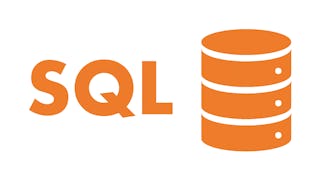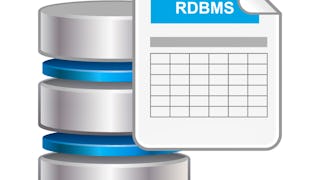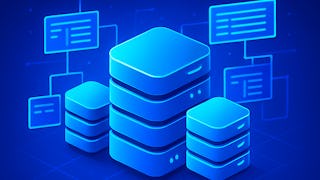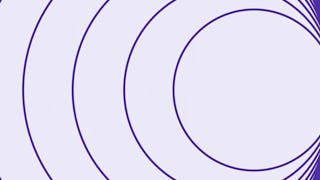Datenbankverwaltungssysteme sind ein wesentlicher Bestandteil der meisten groß angelegten Industrie- und Open-Source-Systeme. Dieser Kurs führt Sie in wichtige Konzepte von Datenbanksystemen und -design ein. Wir lernen, was relationale Datenbanken sind, wofür sie verwendet werden, die Theorie, die ihrem Design zugrunde liegt, und wie man eine Datenbank mit der deklarativen Sprache SQL abfragt und verändert.

Genießen Sie unbegrenztes Wachstum mit einem Jahr Coursera Plus für 199 $ (regulär 399 $). Jetzt sparen.

Einführung in relationale Datenbanken
Dieser Kurs ist Teil mehrerer Programme.


Dozenten: Gerald Balekaki
3.534 bereits angemeldet
Bei enthalten
(32 Bewertungen)
Empfohlene Erfahrung
Was Sie lernen werden
Beschreiben Sie, was relationale Datenbanken sind und wie sie verwendet werden.
Beherrschen Sie das Modell der Relationalen Datenbank.
Nachweis umfassender SQL-Kenntnisse.
Kompetenzen, die Sie erwerben
- Kategorie: Datenmanipulation
- Kategorie: Benutzerkonten
- Kategorie: Datenbank-Management-Systeme
- Kategorie: SQL
- Kategorie: Relationale Datenbanken
- Kategorie: Datenzugriff
- Kategorie: Datenbank-Systeme
- Kategorie: Datenbankarchitektur und -verwaltung
- Kategorie: Abfragesprachen
- Kategorie: Datenbank-Theorie
- Kategorie: Datenmodellierung
- Kategorie: Datenbanken
- Kategorie: Datenbank-Design
- Kategorie: Datenbank Management
Wichtige Details

Zu Ihrem LinkedIn-Profil hinzufügen
21 Aufgaben
Erfahren Sie, wie Mitarbeiter führender Unternehmen gefragte Kompetenzen erwerben.

Erweitern Sie Ihre Fachkenntnisse
- Lernen Sie neue Konzepte von Branchenexperten
- Gewinnen Sie ein Grundverständnis bestimmter Themen oder Tools
- Erwerben Sie berufsrelevante Kompetenzen durch praktische Projekte
- Erwerben Sie ein Berufszertifikat zur Vorlage

In diesem Kurs gibt es 4 Module
Willkommen bei Einführung in relationale Datenbanken! In diesem Kurs werden wir die folgenden Themen behandeln: Datenbankübersicht, Relationale Algebra, SQL. Dieses Lernmodul bietet eine umfassende Einführung in relationale Datenbanken, ihre Anwendungen und Komponenten. Das Modul beginnt mit einer Einführung in Datenbanken und ihre verschiedenen Anwendungen. Anschließend werden die Komponenten relationaler Datenbankschemata besprochen, darunter Relationen, Attribute und Schlüssel. Die Teilnehmer lernen, einfache Datenbankschemata zu entwerfen und verstehen wichtige Datenbankkonzepte wie Datensätze, Datenabfrage und -änderung sowie Primär-/Fremdschlüssel. Das Modul enthält Beispiele aus der Praxis für das praktische Verständnis.
Das ist alles enthalten
7 Videos9 Lektüren6 Aufgaben1 Diskussionsthema
Dieses Lernmodul beschäftigt sich mit den grundlegenden Konzepten und Operationen der relationalen Algebra, der theoretischen Grundlage relationaler Datenbanken. Es führt in die grundlegenden Konzepte der relationalen Algebra wie "Relation", "Tupel" und "Operation" ein und taucht dann in die grundlegenden Operationen der relationalen Algebra ein, einschließlich Auswahl, Projektion und Vereinigung. Die Teilnehmer lernen auch fortgeschrittenere Operationen wie Joins und Divisionen kennen und erweitern so ihr Verständnis dafür, wie komplexe Datenbeziehungen verwaltet werden können. Darüber hinaus behandelt das Modul Kompositions- und Aggregationsoperationen für kompliziertere Datenmanipulationen sowie Operationen zur Änderung von Beziehungen. Dieses Modul vermittelt den Studenten eine solide theoretische Grundlage für die Arbeit mit relationalen Datenbanken.
Das ist alles enthalten
7 Videos5 Lektüren6 Aufgaben
Dieses Lernmodul vermittelt ein vertieftes Verständnis von SQL (Structured Query Language), der standardisierten Sprache zur Verwaltung relationaler Datenbanken. Beginnend mit den Grundlagen lernen die Teilnehmer, SELECT- und Set-Operationen zu verwenden, um relevante Informationen aus Datenbanktabellen zu extrahieren. Das Modul geht dann zu komplexeren Abfragen über, bei denen Joins zum Einsatz kommen, die es den Teilnehmern ermöglichen, Informationen aus mehreren Datenbanktabellen zu finden und zusammenzufassen. Darüber hinaus werden die Modifizierung von Datenbanktabellen, die Definition ihrer Strukturen, die Erstellung von referentiellen Integritätsbeschränkungen zur Wahrung der Datenbankkonsistenz und die Steuerung des Datenbankzugriffs von Benutzern über SQL-Befehle behandelt. Durch das Erlernen von SQL erhalten die Teilnehmer die notwendigen Kenntnisse und Fähigkeiten, um Daten in relationalen Datenbanken effektiv zu verwalten und zu manipulieren.
Das ist alles enthalten
12 Videos6 Lektüren8 Aufgaben
Dieses Modul enthält die abschließende Kursbeurteilung, mit der Ihr Verständnis des Kursmaterials und Ihre Fähigkeit, das im Kurs erworbene Wissen anzuwenden, beurteilt werden soll. Lesen Sie das Kursmaterial gründlich durch, bevor Sie den Test ablegen.
Das ist alles enthalten
1 Aufgabe
Erwerben Sie ein Karrierezertifikat.
Fügen Sie dieses Zeugnis Ihrem LinkedIn-Profil, Lebenslauf oder CV hinzu. Teilen Sie sie in Social Media und in Ihrer Leistungsbeurteilung.
Auf einen Abschluss hinarbeiten
Dieses Kurs ist Teil des/der folgenden Studiengangs/Studiengänge, die von Illinois Techangeboten werden. Wenn Sie zugelassen werden und sich immatrikulieren, können Ihre abgeschlossenen Kurse auf Ihren Studienabschluss angerechnet werden und Ihre Fortschritte können mit Ihnen übertragen werden.¹
Mehr von Datenanalyse entdecken
 Status: Vorschau
Status: VorschauUniversitat Politècnica de València
 Status: Kostenloser Testzeitraum
Status: Kostenloser Testzeitraum
Birla Institute of Technology & Science, Pilani
 Status: Kostenloser Testzeitraum
Status: Kostenloser Testzeitraum
Warum entscheiden sich Menschen für Coursera für ihre Karriere?




Häufig gestellte Fragen
Um Zugang zu den Kursmaterialien und Aufgaben zu erhalten und um ein Zertifikat zu erwerben, müssen Sie die Zertifikatserfahrung erwerben, wenn Sie sich für einen Kurs anmelden. Sie können stattdessen eine kostenlose Testversion ausprobieren oder finanzielle Unterstützung beantragen. Der Kurs kann stattdessen die Option "Vollständiger Kurs, kein Zertifikat" anbieten. Mit dieser Option können Sie alle Kursmaterialien einsehen, die erforderlichen Bewertungen abgeben und eine Abschlussnote erhalten. Dies bedeutet auch, dass Sie kein Zertifikat erwerben können.
Wenn Sie sich für den Kurs einschreiben, erhalten Sie Zugang zu allen Kursen der Spezialisierung, und Sie erhalten ein Zertifikat, wenn Sie die Arbeit abgeschlossen haben. Ihr elektronisches Zertifikat wird Ihrer Seite "Leistungen" hinzugefügt - von dort aus können Sie Ihr Zertifikat ausdrucken oder Ihrem LinkedIn-Profil hinzufügen.
Ja. Für ausgewählte Lernprogramme können Sie eine finanzielle Unterstützung oder ein Stipendium beantragen, wenn Sie die Anmeldungsgebühr nicht aufbringen können. Wenn für das von Ihnen gewählte Lernprogramm eine finanzielle Unterstützung oder ein Stipendium verfügbar ist, finden Sie auf der Beschreibungsseite einen Link zur Beantragung.
Weitere Fragen
Finanzielle Unterstützung verfügbar,





